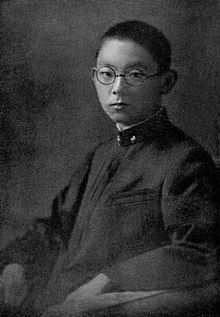Count Higashifushimi Kunihide (東伏見 邦英, 16 May 1910 – 1 January 2014) was the titular head of the Higashifushimi-no-miya, an extinct branch of the Imperial House of Japan, and a Buddhist monk. He was the youngest brother of Empress Kōjun and was the maternal uncle of Emperor Emeritus Akihito. If he had kept his Imperial status, at the time of his death, at age 103, he would have been the longest-lived member, of the Imperial House of Japan.[2] His Dharma name was Jigō (慈洽).[3]
Count Higashifushimi Kunihide | |
|---|---|
東伏見慈洽 | |
 Prince Higashifushimi Kunihide, circa 1920s | |
| Born | 16 May 1910 |
| Died | 1 January 2014 (aged 103) |
| Other names | Kuni Kunihide Higashifushimi Jigō |
| Citizenship | Japan |
| Occupation | Buddhist monk |
| Title | Count (until 1947) |
| Spouse |
Yasuko Kamei (died 2009) |
| Children | 4, including Jiko Higashifushimi |
| Parent(s) | Kuni Kuniyoshi Shimazu Chikako |
| Relatives | Prince Higashifushimi Yorihito (great uncle) Empress Kōjun (sister) Emperor Shōwa (brother-in-law) Emperor Emeritus Akihito (nephew) |
Life
editCount Higashifushimi Kunihide was born as Prince Kuni Kunihide (久邇宮邦英王, Kuni-no-miya Kunihide ō), the youngest child of Lieutenant Colonel Prince Kuniyoshi Kuni (1873–1929) and his wife, the former Shimazu Chikako (1879–1956). Prince Kuni's uncle, Admiral Prince Higashifushimi Yorihito, the head of the Higashifushimi-no-miya line, had no heirs; consequently, following consultations with his father, Prince Kunihide was given to the custody of his great-uncle and his wife on 26 October 1919, though not formally adopted.[4][failed verification] Upon attaining his majority in 1930, he sat in the House of Peers as an imperial prince until the following year, when the Emperor, his cousin and brother-in-law, requested him to relinquish his imperial status to perpetuate the Higashifushimi name.[4] Upon leaving the imperial family, he was ennobled as Count Higashifushimi and appointed a Grand Cordon of the Order of the Paulownia Flowers. He held the title of count until October 1947, when the nobility and cadet branches of the imperial family lost their status.[4]
After taking a degree in history from Kyoto Imperial University, he taught as a lecturer at the university until 1952, when he took his vows as a Buddhist priest in the Zenkō-ji daikanshin in Nagano, becoming the abbot of the Tendai Buddhist Shōren'in Temple in Kyoto the following year, taking the Buddhist name Jigō (慈洽). He took a PhD in Asuka period art from Kyoto University in 1956. He was appointed chairman of the Kyoto Association of Buddhist Temples in 1985, serving until his death. As chairman, he led the opposition to a ¥50 temple admission fee imposed by the city of Kyoto, denouncing it as "contrary to the principle of separation of church and state and freedom of religion." The fee was subsequently repealed.[3]
In 2004, he passed the position of abbot of the Shōren'in to his second son, Jiko Higashifushimi, becoming its emeritus abbot. His wife, Yasuko, died on 29 September 2009, aged 91.[5] He had been bedridden since 2006, due to orthostatic hypotension and he died on 1 January 2014, aged 103.[6][7] As of 4 July 2012, when he surpassed Naruhiko, by reaching the age of 102 years and 49 days, he remains the longest-lived member, of the Imperial House of Japan.[8]
Ancestry
edit| Ancestors of Higashifushimi Kunihide | |||||||||||||||||||||||||||||||||||||||||||||||||||||||||||||||||||||||||||||||||||||||||||||||||||||||||||||||||||||||||||||||||||||||||||||||||||||||||||||||||||||||||||||||||||||||||||||||||||||||||||||||||||||||||||||||||||||||||||||||||||||||||||||||||||||||||||||||||||||||||||||||||||||||||||||||||||||||||||||||||||||||||||||||||||||||||||||||||||||||||||||||||||||||||||||||||||||||||||||||||||||||||||||||||||||||||||||||||||||||||||||||||||||||||||||||||||||||||||||||||||||||||||||||||||||||||||||||||||||||||||||||||||||||||||||
|---|---|---|---|---|---|---|---|---|---|---|---|---|---|---|---|---|---|---|---|---|---|---|---|---|---|---|---|---|---|---|---|---|---|---|---|---|---|---|---|---|---|---|---|---|---|---|---|---|---|---|---|---|---|---|---|---|---|---|---|---|---|---|---|---|---|---|---|---|---|---|---|---|---|---|---|---|---|---|---|---|---|---|---|---|---|---|---|---|---|---|---|---|---|---|---|---|---|---|---|---|---|---|---|---|---|---|---|---|---|---|---|---|---|---|---|---|---|---|---|---|---|---|---|---|---|---|---|---|---|---|---|---|---|---|---|---|---|---|---|---|---|---|---|---|---|---|---|---|---|---|---|---|---|---|---|---|---|---|---|---|---|---|---|---|---|---|---|---|---|---|---|---|---|---|---|---|---|---|---|---|---|---|---|---|---|---|---|---|---|---|---|---|---|---|---|---|---|---|---|---|---|---|---|---|---|---|---|---|---|---|---|---|---|---|---|---|---|---|---|---|---|---|---|---|---|---|---|---|---|---|---|---|---|---|---|---|---|---|---|---|---|---|---|---|---|---|---|---|---|---|---|---|---|---|---|---|---|---|---|---|---|---|---|---|---|---|---|---|---|---|---|---|---|---|---|---|---|---|---|---|---|---|---|---|---|---|---|---|---|---|---|---|---|---|---|---|---|---|---|---|---|---|---|---|---|---|---|---|---|---|---|---|---|---|---|---|---|---|---|---|---|---|---|---|---|---|---|---|---|---|---|---|---|---|---|---|---|---|---|---|---|---|---|---|---|---|---|---|---|---|---|---|---|---|---|---|---|---|---|---|---|---|---|---|---|---|---|---|---|---|---|---|---|---|---|---|---|---|---|---|---|---|---|---|---|---|---|---|---|---|---|---|---|---|---|---|---|---|---|---|---|---|---|---|---|---|---|---|---|---|---|---|---|---|---|---|---|---|---|---|---|---|---|---|---|---|---|---|---|---|---|---|---|---|---|---|---|---|---|---|---|---|---|---|---|---|---|---|---|---|---|---|---|---|---|---|---|---|---|---|---|---|---|---|---|---|---|---|---|---|---|---|---|---|---|---|---|---|---|---|---|---|---|---|---|---|---|---|---|---|---|---|---|---|---|---|---|---|---|---|---|---|---|---|---|---|---|---|---|---|---|---|---|---|---|---|---|---|---|---|---|---|---|---|---|---|---|---|---|---|---|---|---|---|---|---|---|---|---|---|---|
| |||||||||||||||||||||||||||||||||||||||||||||||||||||||||||||||||||||||||||||||||||||||||||||||||||||||||||||||||||||||||||||||||||||||||||||||||||||||||||||||||||||||||||||||||||||||||||||||||||||||||||||||||||||||||||||||||||||||||||||||||||||||||||||||||||||||||||||||||||||||||||||||||||||||||||||||||||||||||||||||||||||||||||||||||||||||||||||||||||||||||||||||||||||||||||||||||||||||||||||||||||||||||||||||||||||||||||||||||||||||||||||||||||||||||||||||||||||||||||||||||||||||||||||||||||||||||||||||||||||||||||||||||||||||||||||
See also
editReferences
edit- ^ "Genealogy of the House of Fushimi-no-miya In the Nineteenth and Twentieth Centuries". Retrieved 7 December 2016.
- ^ Coke, Hope (21 April 2021). "The top 10 longest-living royals in history". Tatler. Retrieved 4 August 2021.
- ^ a b 東伏見慈洽さん死去 天皇陛下の叔父 [Emperor's uncle, Higashifumi Kunihide dies]. Asahi Shimbun Digital (in Japanese). The Asahi Shimbun Company. 1 January 2014. Archived from the original on 2014-01-01. Retrieved 2014-01-01.
- ^ a b c Genealogy
- ^ "東伏見保子さん死去/青蓮院前門主の妻". 四国新聞社. Retrieved 2024-07-01.
- ^ "天皇陛下の叔父、東伏見慈洽氏が死去 103歳". 日本経済新聞 (in Japanese). 2014-01-01. Retrieved 2024-07-01.
- ^ "東伏見慈洽師死去 天皇陛下の叔父、京都・古都税廃止に尽力 - 産経WEST". 2016-12-20. Archived from the original on 2016-12-20. Retrieved 2024-07-01.
{{cite web}}: CS1 maint: bot: original URL status unknown (link) - ^ spiduction66 (2014-01-11). "東伏見邦英伯爵あるいは慈洽門主と横浜プリンス貴賓館の話". 上大岡的音楽生活 (in Japanese). Retrieved 2024-07-01.
{{cite web}}: CS1 maint: numeric names: authors list (link) - ^ "Genealogy". Reichsarchiv. Retrieved 25 October 2017. (in Japanese)